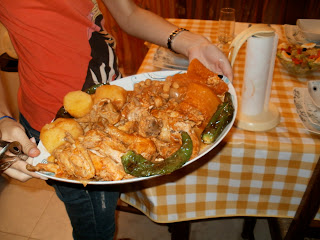Tunisia doesn't have great restaurants, because its really not a restaurant culture. The vast majority of people here live with their family. Young people usually live at home until they get married, and older people live their children. 90% of restaurants serve sandwiches and pizza. This made finding food pretty interesting during the first few weeks when I was living without a kitchen. However right now its Ramadan, so I've been invited to a decent number of "Iftars". The iftar is the meal that Muslims eat at the end of the day to break the fast. So besides some other random pictures, most of the photos of traditional Tunisian food in this post come from home-cooked iftar meals.
 |
| Sandwich Thun- Basically all I ate before I had a kitchen, and my lunch most days before Ramadan (when basically all restaurants close during the day). Sidenote- They put Tuna on EVERYTHING EVER. Seriously, salads, pizza, pastries, whatever you can think of, they combine it with Tuna. |
 |
| Escolape Makloub- Basically a turkey sandwich with pizza crust bread |
|
|
|
 |
| Mayonnaise and harisa. Condiments added to any sandwich. Harisa is a hot sauce made mostly of red pepper and olive oil. |
 |
| Traditional Tunisian sweets. These are mostly fried dough with prunes or dates in the middle |
 |
| Brik- Some combination of fried egg, potato, other veggies, and Tuna in a sort of wonton wrapper |
 |
| Tunisian Tajine- Not to be confused with its superior counterpart, the Morocco Tajine. The Tunisian version is more like a quiche, made with lots of eggs, milk, bread and some veggies |
 |
| Salata Machwiya- "Grilled Salad"- Tomatoes, onions, and green peppers are grilled until they are mushy. Then you mash them together and add a ton of olive oil. The egg bits and olives are optional |
 |
| Don't actually know the name of this- Its basically chicken soup |
 |
| Basic salad, but note the Tuna |
 |
| Bread, an essential part of any meal here. Notice the cool fish shaped ones! |
 |
| The veggies/meat for couscous |
 |
| Desert table! Besides delicious fruit, notice the coffee. They make it by grinding up coffee beans with orange and cardamom and then adding orange blossom water to the final product. Its amazing. |
 |
| Different iftar, same house- This is a sort of brisket type dish, with meat wrapped around an egg filled center. To the right you can also see Shurba, a traditional Tunisian soup |
 |
| Blsdfsadfsdk Soup- Yeah I can't remember/didn't really understand the name, but its a soup made with meat and specific type of plant. The plant is boiled forever and then combined with lots of olive oil. I thought it was really good, despite its off putting color. |
 |
| Another soup I forget the name of- Its made with eggs, tomato sauce, and olive oil |
 |
| Different type of brik- "Brik fingers" |
 |
| Malawi- Not to be confused with the country, this is a traditional type of bread. Its basically fried, layered dough. Really tasty. |
 |
| The market where I now buy all my delicious fruit! |
 |
| More market pics. |
 |
| Even more. |
 |
| Cactus fruit! |
 |
| Notice the guy cutting it is wearing gloves. Even though the large spikes have been removed from the cactus, it still has little ones. I learned this the hard way. |
 |
| Cactus fruit without skin. This and malawi are for sure the foods I'm going to miss the most. |
 |
| Had to have a ketchup pic. The ketchup here is amazing. I never thought I would like anything other than Heinz, but I've been converted |
Thats all the food pics I got. Notice the sad, sad absence of traditional middle eastern fare, like hummus, falafel, tabouli, and baba ganoush. Unfortunately none of those are really available here. There are a few Lebanese places that sell a watery, hummus-like product, but honestly the stuff you find in the US is way better. Which is why Sabra hummus is one of the first things I want to eat when I get back (along with brownies, pancakes, bagels, and delicious delicious cheese).























